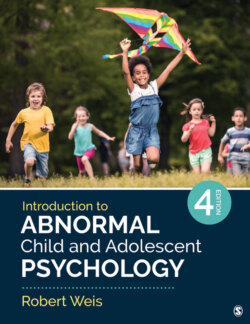Читать книгу Introduction to Abnormal Child and Adolescent Psychology - Robert Weis - Страница 121
На сайте Литреса книга снята с продажи.
What Is the Scientific Method?
ОглавлениеIn addition to the five core principles of scientific thinking, psychological scientists also follow the scientific method: procedures used to gather, evaluate, and organize information about the natural world (Figure 3.1).
At the heart of the scientific method is a theory. A psychological theory is an integrated set of ideas that explain and predict broad aspects of human behavior or development. For example, Jean Piaget (1964) developed a theory of cognitive development in which children progress through four discrete stages from infancy to adulthood. Piaget’s theory organizes our understanding of cognitive abilities across the lifespan and allows us to make predictions about the problem-solving skills of children at various ages.
Similarly, Albert Bandura (1978) developed social learning theory. He believed that children model the behavior of other people, especially when those people are reinforced for acting a certain way. Bandura’s theory organizes our knowledge about the way children learn information and acquire new skills. It lets us predict how children might act when exposed to certain types of models, such as violent video game characters or prosocial peers.
Theories are usually too broad and abstract to test in a single research study. So, scientists develop hypotheses about one or more parts of the theory. A hypothesis is a specific, falsifiable prediction about the relationship between two or more variables. For example, a researcher might hypothesize that children who play violent video games will be more likely to show aggression than children who do not play violent video games. The researcher’s hypothesis tests one aspect of social learning theory, namely, that exposure to violent games will increase children’s likelihood of aggression.
Figure 3.1 ■ The Scientific Method
Note: Psychologists use the scientific method to gather, evaluate, and organize information about human behavior and development.
Scientists use empirical data to test hypotheses. Empirical data refer to information gathered through our senses. Psychologists might observe children during class or recess, ask their parents to complete rating scales about children’s behavior at home, or administer tests to assess children’s intelligence or personality. Scientists do not rely on information from nonempirical sources, such as their personal beliefs, feelings, or the opinions of people in authority.
In order to test a hypothesis using empirical data, researchers must operationally define each variable in the study. An operational definition specifies how each variable will be measured. For example, a researcher might operationally define a child’s “exposure to violent video games” as the number of games the child owns that are rated Mature or Adults Only by the Entertainment Software Rating Board. Similarly, the researcher might operationally define “aggression” as the number of times in the past year the child engaged in pushing, shoving, hitting, or physical fighting at school.
After collecting data, researchers will analyze and interpret their findings. If the results of the study support the researchers’ hypotheses, then they can have greater confidence in the theory upon which their hypotheses are based. Ideally, the researchers will try to replicate their study to see if their findings are reproducible and can be applied to different people or situations.
If the results of the study do not support the researchers’ hypotheses, the researchers may need to modify their theory. Even unsuccessful studies are important because they can help to improve theories and build a better understanding of children’s behavior and development.
Review
The scientific method is a characteristic set of procedures used to gather, evaluate, and organize empirical data about the natural world.
Psychological scientists generate and test specific, falsifiable hypotheses based on broader theories regarding behavior and development.
Scientists rely on empirical data to test hypotheses. They operationally define constructs so they can measure them with greater precision and so other scientists can reproduce their findings.
